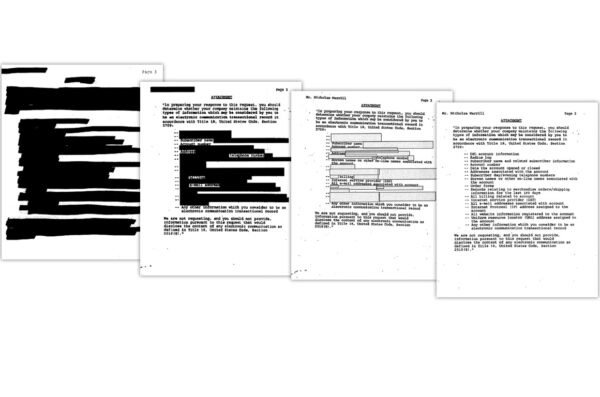ACLU Discloses Documents in Extraordinary Sealed Challenge to Patriot Act Spying Power
FOR IMMEDIATE RELEASE
NEW YORK - The American Civil Liberties Union and New York Civil Liberties Union today disclosed documents in an extraordinary sealed case in federal court involving the Patriot Act's expanded ""National Security Letter"" power. The ACLU lawsuit challenges the constitutionality of a provision that allows the Federal Bureau of Investigation to demand sensitive customer records from businesses without judicial oversight.
The ACLU said it was forced to file the lawsuit about the National Security Letter power under seal to avoid penalties for violating a strict gag provision, which it is also challenging on First Amendment grounds. The case was filed in the Southern District of New York on April 6.
It took nearly three weeks to reach an agreement with the government that allowed the ACLU to disclose anything about the case without fear of penalty. Certain details about the lawsuit remain under seal.
""The National Security Letter provision allows the FBI to demand the sensitive records of innocent people in complete secrecy, without ever appearing before a federal judge,"" said Jameel Jaffer, an ACLU staff attorney.
""Before the Patriot Act, the FBI could use this invasive authority only against suspected terrorists and spies,"" Jaffer said. ""Now it can issue National Security Letters to obtain information about anyone at all. This should be disturbing to all of us.""
The fact that the government agreed only under pressure to allow disclosure of parts of the legal complaint, the ACLU said, demonstrates that the gag order is unnecessarily broad and restrictive.
""It is remarkable that a gag provision in the Patriot Act kept the public in the dark about the mere fact that a constitutional challenge had been filed in court,"" said Ann Beeson, ACLU Associate Legal Director. ""President Bush can talk about extending the life of the Patriot Act, but the ACLU is still gagged from discussing details of our challenge to it.""
In legal papers, the ACLU argues that the National Security Letter provision violates the First and Fourth Amendments because it authorizes the FBI to force disclosure of sensitive information without adequate safeguards. The FBI can issue a National Security Letter without obtaining prior judicial approval, without demonstrating a compelling need to justify the disclosure, and without specifying any mechanism that would allow a recipient to contest the demand.
The lack of such safeguards, the ACLU said, allows the government to unmask anonymous speakers, violating a tradition of anonymous speech that goes back to the Federalist Papers. Protecting this right is especially critical given the large number of Internet users who use pseudonyms to engage in legitimate political speech.
The ACLU first obtained information about the use of National Security Letters last March through a Freedom of Information Act lawsuit. Information about that lawsuit, including some of the records the ACLU obtained from the FBI, are posted at www.aclu.org/patriotfoia.
The ACLU has led opposition to controversial portions of the Patriot Act, filing a challenge to Section 215, another provision that allows the FBI to gain access to sensitive records, and filing briefs before the secret Foreign Intelligence Surveillance Court to oppose expanded wiretaps. With support from a broad right-left coalition, the ACLU has also encouraged passage of approximately 300 local resolutions against anti-civil liberties portions of the law, and has urged Congress to leave in place the ""sunsets"" for Patriot Act provisions set to expire in 2005.
The defendants in the NSL lawsuit include Attorney General John Ashcroft and FBI Director Robert Mueller. The case is assigned to Judge Victor Marrero.
The parties have agreed to a briefing schedule in the case. The ACLU will file a summary judgment motion on May 17, 2004; the government will respond on June 7, 2004; all briefing will be completed in July 2004. The court is likely to schedule arguments in the case in late summer 2004. The case is assigned to Judge Victor Marrero.
A special feature about the case, including the redacted complaint, is online at /nsl.
Attorneys in the case are Jaffer, Beeson and Sharon McGowan of the ACLU, and Arthur Eisenberg of the New York Civil Liberties Union.


